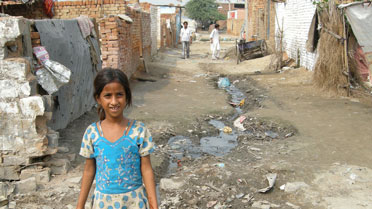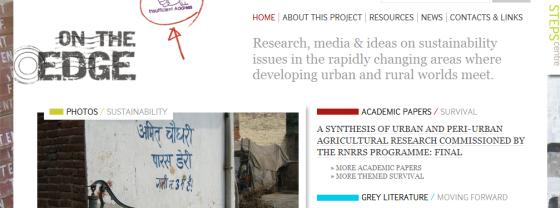In informal spaces on the edge of cities, people can be especially exposed to pollution, diseases and occupational health risks. Through research in India, this project examines the shortfalls in current, official pathways which seek to deal with environmental health, and explores what the alternatives might be. The project ran from 2011 to 2016.
Health in growing cities
With the growth of cities and rapid industrialisation, people are facing new or increased health risks. The speed of growth – coupled with the fact that some spaces are transitional or temporary – has challenged the capacity of public institutions and society to respond.
People in “transitional spaces” – informal, unplanned areas, often at the edge of cities, can be harder hit by these problems: for example, by chronic diseases linked to industrial air and water pollution. How people act and work in informal areas is not always taken into account by official policy and planning. What is more, official policy often disregards the links between environmental change and health.
We will explore alternative pathways currently practised – or envisaged – that rely on understanding of informal practices, informal relationships and processes. We will also highlight contrasts between “official” visions of the future and how local people imagine it; and how these futures are made possible or held back by conditions on the ground. The project also compares Indian policy in this area with policies in South Africa and China.
Aims
- The project will help people involved in policy to recognise various alternative approaches to decision making which consider what environmental health and social justice means for planning and management.
- We also aim to improve the capacity of local and national interest groups to influence policy and planning, and identify where and how the development of environmental health research and training can be supported.
Cases:
The project focuses on two key case studies in peri-urban India
- Understanding the environmnetal health implications of current and alternative initiatives to manage solid waste in cities.
- The challenges of ensuring a safe supply of fresh vegatable produce to cities with increasing industrial pollution in agriicultural areas. Here we seek to understand the environmental health challenges and consider a range of current and alternative appraoches to try to address them.
Resources and publications:
Journal article: Pathways for Sustainable Urban Waste Management and Reduced Environmental Health Risks in India: Winners, Losers, and Alternatives to Waste to Energy in Delhi, Frontiers in Sustainable Cities, May 2020
Working Paper: Waste to Energy in Delhi: Alternatives towards Sustainable Urban Waste Management, TRCSS JNU, June 2018
Policy Brief: Rethinking urban waste management in India, April 2015
Multimedia story: Waste not, want not
A ‘Story from STEPS’ about the working lives of India’s urban waste pickers, showing the hidden connections between everything that matters in the city
Journal article: Policy transformations and translations: lessons for sustainable water management in peri-urban Delhi, India By Fiona Marshall and Pritpal Randhawa February 2014
Event: Symposium on Pathways to Sustainable Solid Waste Management in Delhi (PDF) March 2013
Resources: The STEPS Centre’s Urbanisation theme
STEPS members working on this project:
- Fiona Marshall – Convenor
Partners
- Professor Pranav Desai – Centre for Studies in Science Policy, Jawaharlal Nehru University, Delhi
- Professor Milap Punia – Centre for the Study of Regional Development
- Pritpal Randhawa – Senior Researcher, Centre for Studies in Science Policy, Jawaharlal Nehru University
- Pravin Kushwaha – Researcher, Centre for Studies in Science Policy, Jawaharlal Nehru University
- Ravi Agrawal – Toxicslink, New Delhi
- Dr D S Bhupal – Agricultural Economics Research Centre – Delhi University
- Professor Illora Ghosh – Environmental Sciences, Jawarharlal Nehru University, Delhi
- Lu Jixia – College of Humanities and Development, China Agricultural University, Beijing
Media:
- 4 May 2012: Edge of sustainability: why Rio+20 mustn’t ignore people on city fringe, The Guardian, writeFiona Marshall and Lyla Metha on Poverty Matters, the blog of the Guardian’s Global Development site.
Related projects
On The Edge
A STEPS Centre website featuring academic research, media and images from a variety of sources on sustainability in the peri-urban environment. Link: www.periurbansustainability.org

